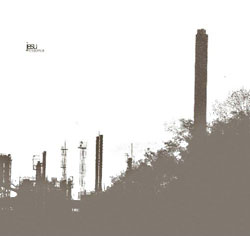Jesu
Conqueror
(Hydra Head)
Inner struggles, drug trips—that’s the stuff of Justin Broadrick’s most prominent project since Godflesh’s dissolution five years ago, according to the Metal Archives Web site. Those guys would know. Extreme music fans since the ’80s, whether leaning toward the aforementioned’s industrial metal or the grindcore of Napalm Death, have been seared by the Birmingham, England–based musician’s influence. And whether mellowed by age or herb, dude’s now intoning about sunrises and love, releasing existential tension through Jesu’s plumes of echo, distortion, and delay. With chugging, crunching guitars mixed low and vocals that reverb out as if from a cavern, Broadrick intends to flatline, not just medicate, on melancholia. Conqueror‘s sensual black moods are like Red House Painters’ “Katy Song” as performed by Isis, an intriguing alternative to the earth-shattering romance of epic contemporaries like Explosions in the Sky. The album’s steady groove clears a path for your mind-set rather than overwhelming it with prefab emotion. This is a far cry from 2004’s abrasive Heart Ache EP; Jesu have evolved into an unlikely new standard-setter for shoegaze excellence. In “Weightless & Horizontal,” Broadrick sings, “I’m way past trying/I’m way past caring”—aw, bullshit. RACHEL SHIMP
Jesu play Neumo’s, 925 E. Pike St., 709-9467, www.neumos.com. $15. All ages. 9 p.m. Tues., April 3.
Low
Drums and Guns
(Sub Pop)
After the welcome (for me) change of pace and aggressive sonic attack of 2005’s The Great Destroyer, Low reunite with producer Dave Fridmann, now something of a house mentor for Sub Pop, having shepherded Sleater-Kinney’s The Woods to disc during the interim. Yet while Drums adds still more aural textures to the Minnesota trio (with bassist Matt Livingston now replacing Zak Sally), the tempos lag back toward the group’s Minnesota molasses canon. One detects drum machines and sequencers at work on “Belarus” and other tracks, which may give Alan Sparhawk and Mimi Parker more room to harmonize, but they already knew how to do that. More encouraging is “Always Fade,” which dares to introduce a bass-drum figure that could actually be remixed for the dance floor. (Do we hear a trace of Yo La Tengo?) “Your Poison” feels like a false start from Destroyer (or simply filler here), while the concluding “Violent Past” opens the organ stops at processional pace. It’s bigger and grander than anything else on this place-holder of an album, an overture that raises the curtain on a rather sparse stage. BRIAN MILLER
RJD2
The Third Hand
(XL Recordings)
There is an odd relationship in music between innovation and staying true to your roots. While each is necessary, straying too far one way or the other is the demise of many albums. It’s a balance thing. In the case of RJD2’s latest, The Third Hand, the album has the balance of a last-call drunk. As he has stated several times, RJD2 meant The Third Hand to be a departure from his hip-hop/turntable roots, opting instead for straight rock and roll. The result is disastrous. Gone are the slow-building, booming drum breaks, and multifaceted, head-bobbing loops and samples that made Dead Ringer and his previous work so solid. In are randomly strummed guitar chords, diddled scales, annoying and mindless vocals, and any semblance of depth to the music. Occasionally, the complex percussion that defined songs like “Chicken Bone Circuit” and “Ghostwriter” shines through, but these are isolated instances. RJ, who played all the instruments himself this time around, needs to stop neglecting his vast collection of samples and stick to what he knows. KEEGAN HAMILTON
El-P
I’ll Sleep When You’re Dead
(Definitive Jux)
Five years ago, N.Y.C. rapper/producer El-P released his brilliant solo debut, Fantastic Damage, on Definitive Jux, his own label that defines 21st-century alternative rap. Fantastic Damage was rife with impenetrable lyrical tangents and raw, menacing beats, and with the 9/11 attacks just a year earlier, El-P’s tense emotions were still bubbling at a fiery, unnerving boiling point. The album was a defining moment for the former Company Flow MC, and the conscious, calculated rhymes and steely production seemed three steps ahead of everything in the rap game at the time. I’ll Sleep When You’re Dead, the long-awaited follow-up to Fantastic Damage, maintains the dystopian, futuristic stride along the haunting path its predecessor forged and dives headfirst into lyrically smart yet disturbing metaphorical situations about, among other things, war (“Habeas Corpus”), oil addiction (“Drive”), and insomnia (“Up All Night”). On “The Overly Dramatic Truth,” even his melodic side chimes in. El-P’s rigid, carnal flow pairs even better with the less fractured, more textured industrious beats on I’ll Sleep When You’re Dead, where he’s once again three steps ahead. TRAVIS RITTER




